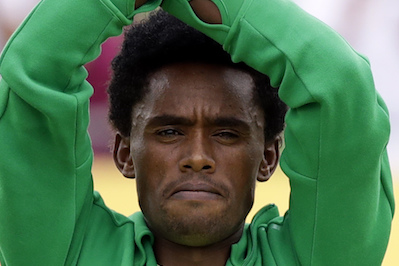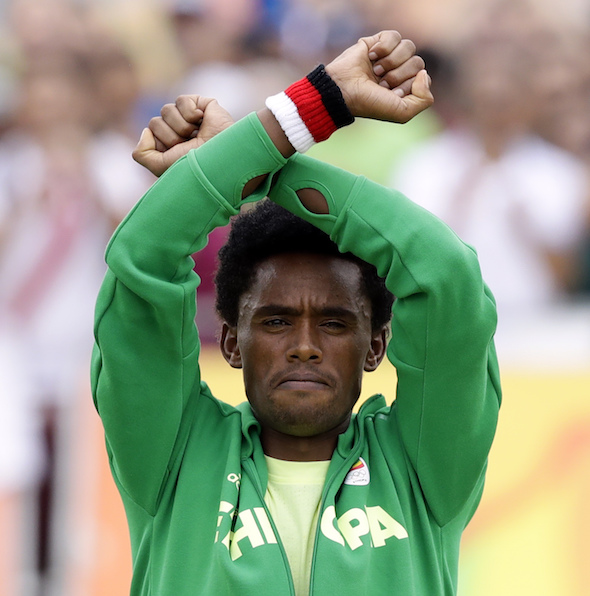Truthdigger of the Week: Feyisa Lilesa, Ethiopian Silver Medalist and Protester
The runner risked death or exile when he finished the men's marathon with arms crossed in defiance of Ethiopia’s abuse of his tribe, the Oromo.

Lilesa repeats his protest gesture at an Olympic ceremony. Ethiopia’s state broadcaster did not air his medal-winning finish. (Robert F. Bukaty)
Every week the Truthdig editorial staff selects a Truthdigger of the Week, a group or person worthy of recognition for speaking truth to power, breaking the story or blowing the whistle. It is not a lifetime achievement award. Rather, we’re looking for newsmakers whose actions in a given week are worth celebrating.
We might excuse Feyisa Lilesa for failing to take comfort in his government’s assurances that he won’t be harmed or jailed if he returns home.
A member of the Oromo tribe of Ethiopia, Lilesa made headlines on the final day of the Rio Olympics when he raised his crossed arms in a gesture of solidarity with the Oromo people as he reached the finish line of the men’s marathon. He repeated the pose later during an Olympic ceremony. According to Human Rights Watch, more than 400 people have been killed and tens of thousands arrested since Nov. 2015, when the Ethiopian government began to forcibly displace Oromo and other people during an effort to develop land around the capital, Addis Ababa.
Amnesty International reported that at least 5,000 Oromos were arrested because of peaceful protests or otherwise opposing the government between 2011 and 2014. Ethiopia disputes the charge. Prime Minister Hailemariam Desalegn told The Guardian earlier this year: “We have clearly identified why this protest has come about: unemployment and lack of good governance. Building democratic culture will take some time. But we are on the right track. It’s improving.”
Long one of the world’s poorest nations, Ethiopia rapidly industrialized over the past decade. In the process, authorities have been repeatedly accused of human rights abuses and discrimination against the Oromo, the country’s largest ethnic group at roughly 35 percent of its 100 million people.
“It is a very dangerous situation for the Oromo people in Ethiopia,” Lilesa told reporters after the race. “In nine months more than 1,000 people died in protests.” CNN and other organizations could not immediately confirm Lilesa’s claim. “They will kill me,” he added. “I haven’t another visa. Maybe I stay here. If I can get visa I can go to America.”
Calling Lilesa “an Ethiopian hero,” Ethiopian Communications Minister Getachew Reda said the 26-year-old “shouldn’t at all be worried” about his safety if he returns home. It’s “a bit of a stretch to assume that your loved ones will be at risk because you have made one gesture or another. I can assure you nothing is going to happen to his family. Nothing is going to happen to him,” Reda added.
Ethiopia’s state broadcaster did not air Lilesa’s silver-medal finish, either when it happened or later.
Human Rights Watch reports that “security forces repeatedly used lethal force, including live ammunition, to break up many of the 500 reported protests that have occurred since November 2015.” The U.S. Embassy in Addis Ababa has said it is “deeply concerned” about the recent killings of protesters. But American officials have done little more to criticize the government. Ethiopia is a U.S. military ally in a fight against Somali resistance groups and a place of relative stability in Eastern Africa.
Lilesa told reporters that members of his family are already in prison and that he’s worried about his wife and two children.
“The Ethiopian government is killing my people, so I stand with all protests anywhere, as Oromo is my tribe,” Lilesa said. “My relatives are in prison, and if they talk about democratic rights they are killed.
“Oromo people now protest what is right, for peace, for a place,” Lilesa continued. “Maybe I move to another country … you get the freedom [in Ethiopia] if you support only the government. You cannot work without that.” A crowdfunded effort to help Lilesa and his family find a home outside Ethiopia raised $155,000 within five days.
In The New York Times, Seyoum Teshome, a university lecturer in central Ethiopia, predicted that the Ethiopian government will treat Lilesa like a hero, at least in public. “They will not do anything silly against that guy,” Teshome said. “The whole world knows about him now. … If they arrest him, it will be a huge mistake and create a further disturbance.”
The Times added that the Ethiopian government “is known to be quite adept at damage control, using urbane officials to deflect criticism.”
Olympic athletes are barred from making political statements during the games, but it appears Lilesa will not face consequences from the organization’s authorities. In 1968, Black American runners Tommie Smith and John Carlos were expelled from the Summer Olympics in Mexico City after famously raising a black power salute while receiving their gold and bronze medals, respectively. Carlos struggled to find a job in the aftermath. His children were bullied at school, and nine years later his wife, Kim, committed suicide — partly, he believes, because the FBI had him under constant surveillance.
Surely at great risk to himself despite what his government says, Feyisa Lilesa made a protest at the Olympics that brought global attention to the plight of his people. He is our Truthdigger of the Week.
Your support is crucial...As we navigate an uncertain 2025, with a new administration questioning press freedoms, the risks are clear: our ability to report freely is under threat.
Your tax-deductible donation enables us to dig deeper, delivering fearless investigative reporting and analysis that exposes the reality beneath the headlines — without compromise.
Now is the time to take action. Stand with our courageous journalists. Donate today to protect a free press, uphold democracy and uncover the stories that need to be told.






You need to be a supporter to comment.
There are currently no responses to this article.
Be the first to respond.